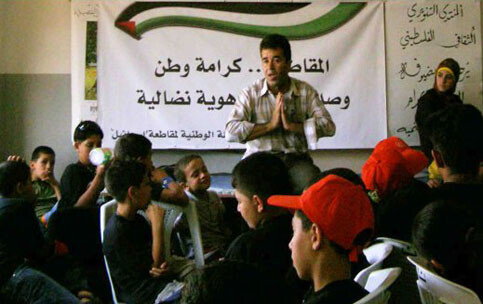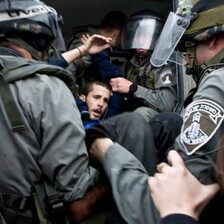The Electronic Intifada 12 February 2010

Wael al-Faqeeh (Freedom for Wael al-Faqeeh campaign)
Salem military court, located in the northern West Bank, is a ramshackle series of prefabricated buildings, marked by the ubiquitous barbed wire and cage-like fencing. We were there to attend the hearing of Palestinian political prisoner Wael al-Faqeeh in Israeli military court on 28 January. However, Israel’s security measures made us feel as though we were entering prison ourselves. Family members of those facing court gathered in the final enclosure before entering the court, never far from the watching eyes of young Israeli soldiers, M-16 rifles slung casually over their shoulders. The minutes crept by as we waited, listlessly passing the hours in this human pen before the prisoner’s name was called.
Only two family members were permitted to attend the trial, culminating in a brief glimpse of the man we came to see. Al-Faqeeh has been held without charge by the Israeli military since his arrest on 9 December 2009. The 28 January hearing that lasted approximately three minutes here in Salem court resulted in the extension of his detention by a further ten days. It was presided over by three military officers who constitute the panel of judges, and ten very young soldiers who forcefully ensured al-Faqeeh remained out of reach from those who came to see him.
For Myassar al-Faqeeh it was the first time to set eyes on her husband since his abduction from their home in Nablus on 9 December. The arrest of al-Faqeeh marked a surge in Israel’s crackdown on grassroots activists working against its regime. The last time we had seen the man who stood before us in the dock, he had not left Nablus in more than ten years, for fear of the arrest that eventually happened in his own home.
Al-Faqeeh’s fear was not borne of guilt. The 45-year-old human rights defender was known throughout the community for his support of Palestinian nonviolent popular resistance. In its bid to repress grassroots nonviolent resistance, Israel has arrested activists like Abdullah Abu Rahmeh and Muhammad Khatib of Bilin village, and Jamal Juma’ of the Stop The Wall campaign, and countless other Palestinians waging unarmed resistance to the Israeli occupation.
The struggle of rural Palestinians is one that al-Faqeeh champions passionately, in his organization of the annual olive harvest in the Nablus region and year-round support for farmers attempting to live their lives under threats of intimidation and harassment from settlers and soldiers. Israel’s master plan for the occupied West Bank, a network of urbanized and isolated bantustans, has seen the ruthless execution of the Oslo accords zoning scheme and the targeting of agricultural communities located in Areas “B” or “C” (under partial and full Israeli control, respectively). Palestinian farmers are rendered powerless, caught in the cogs of this well-oiled bureaucratic occupation.
Al-Faqeeh coordinated weekly demonstrations in Iraq Burin village throughout the months of July and September. The demonstrations held on land once accessible to village farmers, but since annexed by the Bracha settlement, culminated in the return of 30 dunums (a dunam is the equivalent of 1,000 square meters) of the contested land to the village from the Israeli District Coordination Office (DCO). It heralded a rare, if grudging, recognition of the frustration — and indeed crisis — facing Palestinian rural communities and facilitated the return of farmers to their rightful land. The demonstrations were replaced by weekly nonviolent resistance workshops during the hiatus for the month of Ramadan, and were again led by al-Faqeeh.
Following the demonstrations, al-Faqeeh received a threatening phone call from the DCO warning that he would be apprehended if he was involved in the organization of further activities in the village.
“On the night of 9 December at 1:30am, I was going to sleep,” said Myassar al-Faqeeh, recalling the invasion of her home. “I heard movements outside and when Wael went to look out the window he saw soldiers surrounding the house. He quickly came in to the bedroom to tell me what was going on, when the soldiers kicked the door open and began throwing rocks into the house. The army captain entered and ordered Wael to hand over his ID. He told him to put his clothes on. I gave him his clothes, while whispering, ‘You are a very strong man, and your family is very strong.’ Then the soldiers tied his hands, while our children watched and cried. Wael told them not to worry and to take care of their mother. We kissed him to say goodbye, and they led him to the jeep. He waved goodbye to us from the window. Now we can only wait for him to be returned to us, since he was taken that night.”
Surge in arrests
Al-Faqeeh was not the only activist taken that night. Eight others were seized from their homes in the Nablus region, including Myassar Itiani and her brother Abdul-Nasser Itiani, both active in prisoners rights organizations and the popular resistance movement. Moussa Salama, who is involved in the Labor Committee of Medical Relief for Workers, was also arrested. All nine of the arrestees were held on the grounds of affiliation with the left-wing political party, the Popular Front for the Liberation of Palestine (PFLP). Since 9 December, 15 individuals have been arrested from Nablus on related suspicions, driving deep cracks through the movement’s regional base.
The repressive arrests violate the Oslo accords zoning agreements, under which Nablus is considered “Area A” and in principle is under full Palestinian control. Military incursions in Nablus slowed to a trickle in 2009, as months of relative calm were punctuated by only sporadic incursions. These incursions serve as reminders that while the occupation may have ostensibly retreated to beyond the city limits, its grip may be tightened at a moment’s notice at the whims of a military commander.
Following his arrest, al-Faqeeh was transferred to Jalameh Prison outside Haifa. Despite the illegality of the transfer of prisoners from the occupied territories into the territory of the occupying power, a vast majority of Palestine’s 8,000 prisoners languish in prisons inside Israel. Al-Faqeeh’s interrogation period in Jalameh lasted a harrowing five weeks, almost half the period Israel allows itself legally for Palestinian prisoners. He is now held in Megiddo prison, still without charge and awaiting trial — a period for which there is no cap for Palestinian prisoners detained by Israel.
When he eventually stands trial in front of a court of army officers, the charges that will be brought against al-Faqeeh pertain to alleged membership in an “illegal” organization and providing a service to an illegal organization (the PFLP), facing a maximum sentence of three to five years. The charge comes largely from a confession extracted from a 16-year-old boy arrested from al-Ein refugee camp in Nablus, the same night as al-Faqeeh, after a grueling 10-day interrogation in Jalameh prison.
Khalida Jarrar, a member of the Palestinian Legislative Council (PLC) representing the PFLP, dismisses the basis of party affiliation for the arbitrary arrest of activists such as al-Faqeeh. “I believe it is not the real reason,” she said. “But it is always the excuse for those who are active against [Israel’s] wall, against the settlements, the confiscation of land. And in the last few months we have heard this excuse a lot, as more and more activists are arrested on the pretext of party support. Even the pretext is in violation of their political rights — anybody has the right to support any political organization.”
Israeli military law
Diversion of focus to a detainee’s membership or support of any organization serves the purposes of the Israeli prosecutors, by further subscribing to state definitions of terrorism, such as the designation of the PFLP as a terrorist organization — and the non-definition of state terrorism, such as that executed by Israeli occupation forces. The crux of the argument should not rest on verification of how prisoners exercise their basic human right of freedom of association, but is a point Israeli military law has systematically distorted and consequently disabled the basis of Palestinian prisoners’ legal defense.
The laws comprising the basis of al-Faqeeh’s arrest stand amongst the some 2,500 individual Israeli military laws and orders applicable in the West Bank. Their implementation commenced as soon as it became possible to do so, virtually from day one of its occupation in 1967. Military proclamation no. 1, issued on 7 June 1967, states that “in the interests of security and public order” all legal authority remains in the hands of the military commander. The extent of military law in the Occupied Palestinian Territories (OPT) has since swelled and grown to facilitate everything from imprisonment to land confiscation. Laws may be introduced or adjusted at any time, without the requirement to announce such implementations, frequently resulting in the apprehension and indictment of Palestinians who were not even aware that they were committing a crime.
Israeli military law in the OPT is written, enforced and adjudicated by Israeli military personnel which effectively annuls the possibility of an accused person receiving a fair trial. Israel’s enforcement of military law in the OPT is collective, from the traumatic experience of arrest (for both the arrestee and his or her family), abusive interrogation methods and the practice of coercion in efforts to turn prisoners on one another, the break-up of family units, the mockery of the Israeli kangaroo courts, to the long, dark months — or years — spent behind bars. Those processed by the Israeli military court system are left with the resounding impression that guilt is assumed over innocence and entirely perfunctory in nature, to exude the appearance of a functioning, democratic legal system.
These recent attempts to suppress Palestinian nonviolent resistance and its leaders like Wael al-Faqeeh are reminiscent of the early days of the first Palestinian intifada. During that period, peaceful mobilization sent Israeli military commanders scrambling, as their brute force was rendered impotent against its tactics — and the worldwide condemnation they engendered. The demonstrations of Bilin, Budrus, Jayyous, Iraq Burin and countless other villages have captured the minds (and media attention) of those beyond Palestine’s borders and highlight Israel’s disproportionate use of force against unarmed activists. It is only a matter of time before Israel is held accountable for its draconian systems of human rights abuse, military laws and prisons.
Bridget Chappell is an Australian activist and writer who has been working with the International Solidarity Movement in Palestine since August 2009. She is based in Nablus.



